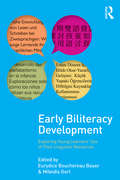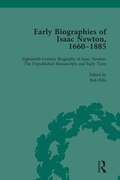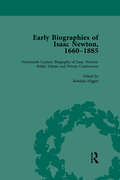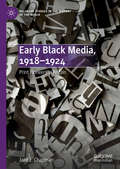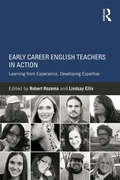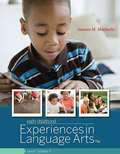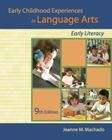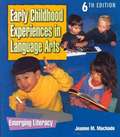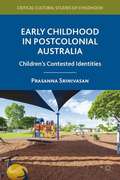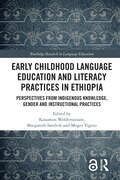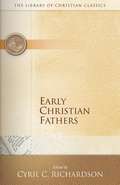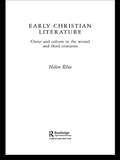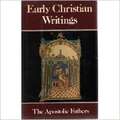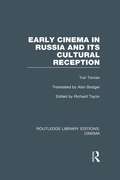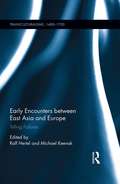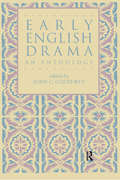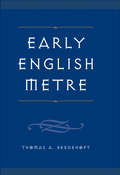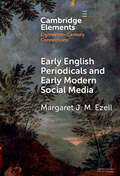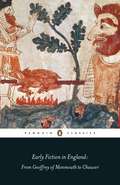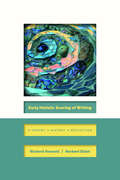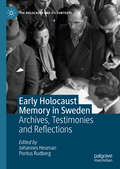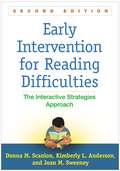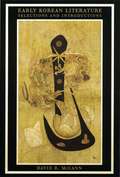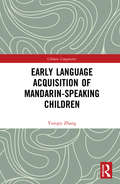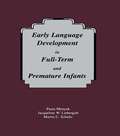- Table View
- List View
Early Biliteracy Development: Exploring Young Learners' Use of Their Linguistic Resources
by Eurydice Bouchereau Bauer Mileidis GortA large and growing number of students from culturally and linguistically diverse backgrounds in the US and around the world have the potential to develop bilingualism and biliteracy if supported in their immediate environment. At the forefront in focusing exclusively on biliteracy development in early childhood across a variety of languages, this book provides both findings from empirical research with young bilinguals in home and school contexts and practical applications of these findings. Each chapter is structured in a similar format to offer parallel descriptions of the research, including a brief review of related empirical studies, an overview of the methods for data collection and analysis, a description of the main findings, and specific pedagogical implications to support educators’ efforts to construct meaningful, challenging, and dynamic literacy and language learning communities where one or more languages are used for communicating and learning. Pushing the field forward, this book is a valuable resource for helping literacy educators understand and respond to critical issues related to the development of young children’s literate competencies in two languages in home and school contexts.
Early Biographies of Isaac Newton, 1660-1885 vol 1
by Rebekah Higgitt Rob Iliffe Milo KeynesA collection of the many biographies of scientist Isaac Newton, demonstrating the ways in which his reputation continued to develop in the centuries after his death. It includes private letters, poetry and memoranda, and explores the debate over Newton's reputation, work and personal life.
Early Biographies of Isaac Newton, 1660-1885 vol 2
by Rebekah Higgitt Rob Iliffe Milo KeynesA collection of the many biographies of scientist Isaac Newton, demonstrating the ways in which his reputation continued to develop in the centuries after his death. It includes private letters, poetry and memoranda, and explores the debate over Newton's reputation, work and personal life.
Early Black Media, 1918–1924: Print Pioneers in Britain (Palgrave Studies in the History of the Media)
by Jane L. ChapmanThis book represents the first systematic attempt to analyse media and public communications published in Britain by people of African and Afro-Caribbean origin during the aftermaths of war, presenting an in-depth study of print publications for the period 1919-1924. This was a period of post-conflict readjustment that experienced a transnational surge in special interest newspapers and periodicals, including visual discourse. This study provides evidence that the aftermath of war needs to be given more attention as a distinctly defined period of post-conflict adjustment in which individual voices should be highlighted. As such it forms part of a continuing imperative to re-discover and recuperate black history, adding to the body of research on the aftermaths of The First World War, black studies, and the origins of diaspora.Jane L. Chapman analyses how the newspapers of black communities act as a record of conflict memory, and specifically how physical and political oppression was understood by members of the African Caribbean community. Pioneering black activist journalism demonstrates opinions on either empowerment or disempowerment, visibility, self-esteem, and economic struggles for survival.
Early Career English Teachers in Action: Learning from Experience, Developing Expertise
by Robert Rozema Lindsay EllisThe first few years of teaching are critical to the professional development of effective English teachers. In these crucial years, new teachers establish their identities, learn the ins and outs of the curriculum, acclimate to unfamiliar communities, and cope with student behaviors that they never expected. All of this can be daunting for novice teachers. This book can help. The stories within are written by English teachers in the early stages of their careers. In their carefully crafted narratives, teachers offer practical strategies, professional insights, and a wealth of tips for surviving the first years in the classroom. The narratives are grouped into thematic chapters with brief introductions of key terms, helpful learning activities, and provocative discussion questions, all intended to foster critical conversation about beginning a career teaching English. In a time when many teachers leave the profession too soon, Early Career English Teachers in Action gives voice to those who have decided to stay. More importantly, this book validates teacher narratives as a powerful way of understanding what happens inside of the classroom—a way that provides more authentic evidence of learning than standardized test scores will ever supply.
Early Childhood Experiences In Language Arts: Early Literacy
by Jeanne MachadoEARLY CHILDHOOD EXPERIENCES IN LANGUAGE ARTS: EARLY LITERACY, Eleventh Edition responds to national legislation, professional standards, and public concern about the development of young children's language and foundational literacy skills by providing current research-based instructional strategies in early language development. Activities throughout emphasize the relationship between listening, speaking, reading, writing (print), and viewing in language arts areas. This text addresses the cultural and ethnic diversity of children and provides techniques and tips for adapting curricula. Theory is followed by how-to suggestions and plentiful examples of classic books and stories, poems, finger plays, flannel board and alphabet experiences, puppetry, language games, drama, and phonemic and phonetic awareness activities. Students will also learn how, as teachers, they can best interact with children to promote appropriate language development, and how they can create a print-rich environment in the classroom.
Early Childhood Experiences in Language Arts: Early Literacy (Ninth Edition)
by Jeanne M. MachadoEARLY CHILDHOOD EXPERIENCE IN THE LANGUAGE ARTS: EARLY LITERACY, Ninth Edition is a tried and true reference aiming to help produce teachers who matter, teachers who are prepared, and teachers who are knowledgeable companions in exploring and sharing literature and language experiences with young children. To achieve this, the book encourages reflective thinking, allows practice of skills, and inspires the collection of ideas for future use. Many new features in the ninth edition will equip readers with valuable information they can take directly into practice. The book includes the most current national legislative efforts, as well as attention to public concern and interest in young children's language and foundational literacy skills. It also thoroughly addresses the interrelation of listening, speaking, reading, writing, and viewing language arts areas. While taking a high-level view that paints a comprehensive picture of the most important aspects of teaching early literacy, the book also takes a practical approach. Readers will learn specific activities that include stories, poems, finger plays, and puppetry that they can use in a classroom setting. They also will learn curriculum for infants, toddlers, and preschoolers, with the theory followed up by deliberate how-to suggestions. Cultural diversity is addressed, as well as program planning ideas for English language learners and special-needs children.
Early Childhood Experiences in Language Arts: Emerging Literacy (6th Edition)
by Jeanne M. MachadoEarly Childhood Experiences in Language Arts: Emerging Literacy is a must-have resource on language arts instruction for young children. Combining current research and appropriate early childhood practices, it fosters an understanding of how techniques and planned programs affect children's language development. Rich in examples and activities, no teacher, child care provider, or parent should be without this invaluable resource.
Early Childhood In Postcolonial Australia
by Prasanna SrinivasanEarly Childhood in Postcolonial Australia is a critical narration of how Australian children use cultural markers such as, skin color, diet and religious practices to build their identity categories of "self" and "other. "
Early Childhood Language Education and Literacy Practices in Ethiopia: Perspectives from Indigenous Knowledge, Gender and Instructional Practices (Routledge Research in Language Education)
by Kassahun Weldemariam Margareth Sandvik Moges YigezuThis edited volume explores how indigenous knowledges and practices can be instrumental in improving literacy outcomes and teacher development practices in Ethiopia, aiding children’s long-term reading, and learning outcomes. The chapters present research from a collaborative project between Ethiopia and Norway and demonstrate how students can be supported to think pragmatically, learn critically and be in possession of the citizenship skills necessary to thrive in a multilingual world. The authors celebrate multilingualism and bring indigenous traditions such as oracy, storytelling, folktales to the fore revealing their positive impact on educational attainment. Addressing issues of language diversity and systematic ignorance of indigenous literacy practices, the book plays a necessary role in introducing Ethiopia’s cultural heritage to the West and, hence, bridges the cultural gaps between the global north and global south. Arguably contributing one of the first publications on early literacy in Ethiopian languages, this book will appeal to scholars, researchers and postgraduate students studying the fields of early years literacy and language, indigenous knowledge and applied linguistics more broadly.
Early Christian Fathers
by Cyril C. RichardsonThis selection of writings from early church leaders includes work by Clement of Rome, Ignatius, Polycarp, Irenaeus, Athenagoras, and Justin Martyr. Long recognized for the quality of its translations, introductions, explanatory notes, and indexes, the Library of Christian Classics provides scholars and students with modern English translations of some of the most significant Christian theological texts in history. Through these works--each written prior to the end of the sixteenth century--contemporary readers are able to engage the ideas that have shaped Christian theology and the church through the centuries.
Early Christian Literature: Christ and Culture in the Second and Third Centuries (Routledge Early Church Monographs)
by Helen RheeHelen Rhee’s outstanding work is the first book to bring together The Apologies and the semi-fictional Apocryphal Acts and Martyr Acts in a single study. Filling a significant gap in the scholarship, she looks at Christian self definition and self representation in the context of pagan-Christian conflict. Using an interdisciplinary approach; historical, literary, theological, sociological, and anthropological, Rhee studies the Christians in the formative period of their religion; from mid first to early third centuries. She examines how the forms of Greco-Roman society were adapted by the Christians to present the superiority of Christian monotheism, Christian sexual morality, and Christian (dis)loyalty to the Empire. Tackling broad topics, including theology, asceticism, sexuality and patriotism, this book explores issues of cultural identity and examines how these propagandist writings shaped the theological, moral and political trajectories of Christian faith and contributed largely to the definition of orthodoxy. This thorough study will benefit all students of early Christianity and Greco-Roman literary culture and civilization.
Early Christian Writings
by Apostolic FathersThe writings in this volume cast a glimmer of light upon the emerging traditions and organization of the infant church, during an otherwise little-known period of its development. A selection of letters and small-scale theological treatises from a group known as the Apostolic Fathers, several of whom were probably disciples of the Apostles, they provide a first-hand account of the early Church and outline a form of early Christianity still drawing on the theology and traditions of its parent religion, Judaism. Included here are the first Epistle of Bishop Clement of Rome, an impassioned plea for harmony; The Epistle of Polycarp; The Epistle of Barnabas; The Didache; and the Seven Epistles written by Ignatius of Antioch - among them his moving appeal to the Romans that they grant him a martyr's death.
Early Cinema in Russia and its Cultural Reception (Routledge Library Editions: Cinema)
by Yuri TsivianThis book examines the development of cinematic form and culture in Russia, from its late nineteenth-century beginnings as a fairground attraction to the early post-Revolutionary years. The author traces the changing perceptions of cinema and its social transition from a modernist invention to a national art form. He explores reactions to the earliest films from actors, novelists, poets, writers and journalists. His richly detailed study of the physical elements of cinematic performance includes the architecture and illumination of the cinema foyer, the speed of projection and film acoustics. In contrast to standard film histories, this book focuses on reflected images: rather than discussing films and film-makers, it features the historical film-goer and early writings on film. The book presents a vivid and changing picture of cinema culture in Russia in the twilight of the tsarist era and the first decades of the twentieth century. The study expands the whole context of reception studies and opens up questions about reception relevant to other national cinemas.
Early Encounters between East Asia and Europe: Telling Failures (Transculturalisms, 1400-1700)
by Michael Keevak Ralf HertelWhile inquiries into early encounters between East Asia and the West have traditionally focused on successful interactions, this collection inquires into the many forms of failure, experienced on all sides, in the period before 1850. Countering a tendency in scholarship to overlook unsuccessful encounters, it starts from the assumption that failures can prove highly illuminating and provide valuable insights into both the specific shapes and limitations of East Asian and Western imaginations of the Other, as well as of the nature of East-West interaction. Interdisciplinary in outlook, this collection brings together the perspectives of sinology, Japanese and Korean studies, historical studies, literary studies, art history, religious studies, and performance studies. The subjects discussed are manifold and range from missionary accounts, travel reports, letters and trade documents to fictional texts as well as material objects (such as tea, chinaware, or nautical instruments) exchanged between East and West. In order to avoid a Eurocentric perspective, the collection balances approaches from the fields of English literature, Spanish studies, Neo-Latin studies, and art history with those of sinology, Japanese studies, and Korean studies. It includes an introduction mapping out the field of failures in early modern encounters between East Asia and Europe, as well as a theoretically minded essay on the lessons of failure and the ethics of cross-cultural understanding.
Early English Drama: An Anthology
by John C. ColdeweyFirst Published in 1993. Routledge is an imprint of Taylor & Francis, an informa company.
Early English Metre
by Thomas A. BredehoftThomas A. Bredehoft's Early English Metre is a reassessment of the metrical rules for English poetry from Beowulf to Layamon. Bredehoft offers a new account of many of the most puzzling features of Old English poetry - anacrusis, alliteration patterns, rhyme, and hypermetric verses - and further offers a clear account of late Old English verse as it descended from the classical verse as observed in Beowulf. He makes the surprising and controversial discovery that Ælfric?s alliterative works are formally indistinguishable from late verse.Discussing the early Middle English verse-forms of Layamon's Brut, Bredehoft not only demonstrates that they can be understood as developing from late Old English, but that Layamon seems to have known, and quoted from, the poems of the Anglo-Saxon Chronicle. Early English Metre presents a new perspective on early English verse and a new perspective on much of early English literary history. It is an essential addition to the literature on Old and Middle English and will be widely discussed amongst scholars in the field.
Early English Periodicals and Early Modern Social Media (Elements in Eighteenth-Century Connections)
by Margaret J. EzellUsing the lens of early modern social authorship and contemporary social media, this Element explores a new print genre popular in England at the end of the seventeenth and early eighteenth centuries, the periodical. Traditionally, literary history has focused on only one aspect, the periodical essay. This Element returns the periodical to its original, complex literary ecosystem as an ephemeral text competing for an emerging audience, growing out of a social authorship culture. It argues that the relationship between authors, publishers, and audiences in the early periodicals is a dynamic participatory culture, similar to what modern readers encounter in the early phases of the transition from print to digital, as seen in social media. Like our current evolving digital environment, the periodical also experienced a shift from its original practices stressing sociability to a more commercially driven media ecology. This title is also available as Open Access on Cambridge Core.
Early Fiction in England: From Geoffrey of Monmouth to Chaucer
by Laura AsheA brilliant new anthology that shows how fiction was reinvented in the twelfth century after an absence of hundreds of years. Essential for all students of medieval literature, Early Fiction in England includes extracts by Geoffrey of Monmouth, Wace, Marie de France, Chaucer and many others, in new translations and with illuminating introductions. Before the twelfth century, fiction had completely disappeared in Europe. In this important and provocative book, Laura Ashe shows how English writers brought it back, composing new tales about King Arthur, his knights and other heroes and heroines in Latin, French and English. Why did fiction disappear, and why did it come to life again to establish itself the dominant form of literature ever since? And what do we even mean by the term 'fiction'? Gathering extracts from the most important texts of the period by Wace, Marie de France, Chaucer and others, this volume offers an absorbing and surprising introduction to the earliest fiction in England.The anthology includes a general introduction by Laura Ashe, introductions to each extract, explanatory notes and other useful editorial materials. All French and Latin texts have been newly translated, while Middle English texts include helpful glosses.Laura Ashe is a University Lecturer in English and Fellow of Worcester College, Oxford. Her first book Fiction and History in England, 1066-1200 (Cambridge University Press, 2007) has been followed by numerous articles and edited collections; she is now writing the newOxford English Literary History vol. 1: 1000-1350 (Oxford University Press).
Early Holistic Scoring of Writing: A Theory, a History, a Reflection
by Norbert Elliot Richard HaswellWhat is the most fair and efficient way to assess the writing performance of students? Although the question gained importance during the US educational accountability movement of the 1980s and 1990s, the issue had preoccupied international language experts and evaluators long before. One answer to the question, the assessment method known as holistic scoring, is central to understanding writing in academic settings. Early Holistic Scoring of Writing addresses the history of holistic essay assessment in the United Kingdom and the United States from the mid-1930s to the mid-1980s—and newly conceptualizes holistic scoring by philosophically and reflectively reinterpreting the genre’s origin, development, and significance. The book chronicles holistic scoring from its initial origin in the United Kingdom to the beginning of its heyday in the United States. Chapters cover little-known history, from the holistic scoring of school certificate examination essays written by Blitz evacuee children in Devon during WWII to teacher adaptations of holistic scoring in California schools during the 1970s. Chapters detail the complications, challenges, and successes of holistic scoring from British high-stakes admissions examinations to foundational pedagogical research by Bay Area Writing Project scholars. The book concludes with lessons learned, providing a guide for continued efforts to assess student writing through evidence models. Exploring the possibility of actionable history, Early Holistic Scoring of Writing reconceptualizes writing assessment. Here is a new history that retells the origins of our present body of knowledge in writing studies.
Early Holocaust Memory in Sweden: Archives, Testimonies and Reflections (The Holocaust and its Contexts)
by Pontus Rudberg Johannes HeumanThis book investigates the memory of the Holocaust in Sweden and concentrates on early initiatives to document and disseminate information about the genocide during the late 1940s until the early 1960s. As the first collection of testimonies and efforts to acknowledge the Holocaust contributed to historical research, judicial processes, public discussion, and commemorations in the universalistic Swedish welfare state, the chapters analyse how and in what ways the memory of the Holocaust began to take shape, showing the challenges and opportunities that were faced in addressing the traumatic experiences of a minority. In Sweden, the Jewish trauma could be linked to positive rescue actions instead of disturbing politics of collaboration, suggesting that the Holocaust memory was less controversial than in several European nations following the war. This book seeks to understand how and in what ways the memory of the Holocaust began to take shape in the developing Swedish welfare state and emphasises the role of transnational Jewish networks for the developing Holocaust memory in Sweden.
Early Intervention for Reading Difficulties: The Interactive Strategies Approach
by Joan Sweeney Donna Scanlon Kimberly AndersonGrounded in a strong evidence base, this indispensable practitioner guide and text has given thousands of teachers tools to support the literacy growth of beginning and struggling readers in grades K-2. The interactive strategies approach (ISA) is organized around core instructional goals related to enhancing word learning and comprehension of text. The book provides guidance for assessment and instruction in whole-class, small-group, and one-to-one settings, using the curricular materials teachers already have.
Early Korean Literature: Selections and Introductions
by David McCannPreeminent scholar and translator David R. McCann presents an anthology of his own translations of works ranging across the major genres and authors of Korean writing—stories, legends, poems, historical vignettes, and other works—and a set of critical essays on major themes.A brief history of traditional Korean literature orients the reader to the historical context of the writings, thus bringing into focus this rich literary tradition. The anthology of translations begins with the Samguk sagi, or History of the Three Kingdoms, written in 1145, and ends with "The Story of Master Hô," written in the late 1700s. Three exploratory essays of particular subtlety and lucidity raise interpretive and comparative issues that provide a creative, sophisticated framework for approaching the selections.
Early Language Acquisition of Mandarin-Speaking Children (Chinese Linguistics)
by Yunqiu ZhangCompared with other subdisciplines in Chinese linguistics, children’s language acquisition is a significant field with relatively limited achievements. Based on data from a dynamic and developmental corpus, this book is a comprehensive exploration of the early development of Chinese-speaking children’s language acquisition. Anchoring the discussions regarding phonetics, semantics and aspects of syntax in a cognitive and functional framework, the author conducts an in-depth analysis of many acquisition characteristics, such as the inevitable and incidental errors of their learning of initials; their ability to obtain the concept of time at a young age and the utilization of Le in the expression of the past tense; their understanding of subjectivity at a young age and the ability to express it; their learning of the degree of modality following the order of from probability to necessity; and children’s acquisition of syntactic structures being impacted by genetics and also affected by the steps involved in syntactic processing. Although genetics, cognition and experience all play a role in children’s language acquisition, this book focuses on the role of cognitive functions. By successfully explaining the acquisition rules based on some cutting-edge linguistic theories, the book will certainly be beneficial to scholars studying linguistics, psychology, cognitive science and early childhood educators.
Early Language Development in Full-term and Premature infants
by Paula Menyuk Jacqueline W. Liebergott Martin C. SchultzDesigned to provide practical information to those who are concerned with the development of young children, this book has three goals. First, the authors offer details about patterns of language development over the first three years of life. Although intensive studies have been carried out by examining from one to 20 children in the age range of zero to three years, there has been no longitudinal study of a sample as large as this--53 children--nor have as many measures of language development been obtained from the same children. Examining language development from a broad perspective in this size population allows us to see what generalizations can be made about patterns of language development. This volume's second goal is to examine the impact of such factors as biology, cognition, and communication input--and the interaction of these factors--which traditionally have been held to play an important role in the course of language development. The comparative influence of each--and the interaction of all three--were examined statistically using children's scores on standard language tests at age three. The volume's third goal is to provide information to beginning investigators, early childhood educators, and clinicians that can help them in their practice. This includes information about what appear to be good early predictors of language development at three years; language assessment procedures that can be used with children below age three, how these procedures can be used, what they tell us about the language development of young children; and what warning signs should probably be attended to, and which can most likely be ignored. In addition, suggestions are made about what patterns of communicative interaction during the different periods of development seem to be most successful in terms of language development outcomes at three years, and what overall indications the study offers regarding appropriate intervention.
